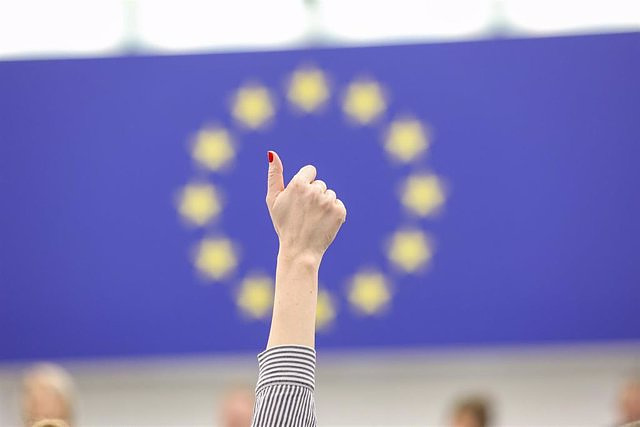Calls for a moratorium on the purchase and use of spyware and narrowing the definition of national security
BRUSSELS, 24 Ene. (EUROPE PRESS) -
The European Parliament's commission of inquiry into espionage with the Pegasus software is studying to ask Spain to clarify the attacks on people who were not threats to national security, within the framework of a resolution proposal with a series of recommendations for the Twenty-seven and the European Comission.
This document, prepared by the Dutch liberal Sophie In't Veld, is the main political act that will come out of the commission created 'ad hoc' to investigate cyber espionage in the Union, although it will still be subject to amendments by the groups before of its vote in committee and in plenary session.
The resolution proposal concludes that Spain raises "questions" about the use of cyber espionage since "although the regulatory framework in Spain seems to be in line" with the requirements established by the EU Treaties and by the rulings of the European courts, MEPs they have been subjected to cyber espionage and lawyers, politicians, activists and journalists "were attacked when there were no charges against them or imminent threats to national security."
For all these reasons, the text calls on the Spanish authorities to provide complete clarity in all alleged cases of spyware use, guarantee real and significant legal protection for all victims, and that investigations be concluded without delay.
Apart from specific measures for Poland, Hungary, Greece, Cyprus and Spain, in general terms the In't Veld resolution calls for a moratorium on the use of these programs, studying possible exceptions for Member States that have demonstrated responsible use and in accordance to fundamental rights.
It also calls for a common EU definition of the term national security, noting that Member States currently use it as a "wild card" and it serves to prevent cooperation and not allow access to information. "You have to define what rules apply and that they are based on European standards, this has become the wild west," she assured.
During the debate in committee, the PP MEP, Juan Ignacio Zoido, announced that his group will present amendments, defending that the document must be "balanced", reflect the findings of the missions and not prejudge the situation in the Member States.
Zoido has called for "caution" when treating "distorted accusations" as facts and has called for reflection on the need for spyware as "part of the security arsenal", defending that it is sometimes "essential" for the forces of the order. He has thus made clear his opposition to a possible moratorium or ban on tools like Pegasus in the EU.
On behalf of The Greens, Hannah Neumann has demanded that the burden of proof be reversed and that the Member States have to justify espionage for national security, emphasizing that in any situation the European conventions and the European Charter of Human Rights are respected. .
Meanwhile, Left MEP Cornelia Ernst has advocated going further by calling for these programs to be banned in the EU. "I don't think these programs can be reformed, borders have to be set," she insisted.

 Exploring Cardano: Inner Workings and Advantages of this Cryptocurrency
Exploring Cardano: Inner Workings and Advantages of this Cryptocurrency Seville.- Economy.- Innova.- STSA inaugurates its new painting and sealing hangar in San Pablo, for 18 million
Seville.- Economy.- Innova.- STSA inaugurates its new painting and sealing hangar in San Pablo, for 18 million Innova.- More than 300 volunteers join the Andalucía Compromiso Digital network in one month to facilitate access to ICT
Innova.- More than 300 volunteers join the Andalucía Compromiso Digital network in one month to facilitate access to ICT Innova.-AMP.- Ayesa acquires 51% of Sadiel, which will create new technological engineering products and expand markets
Innova.-AMP.- Ayesa acquires 51% of Sadiel, which will create new technological engineering products and expand markets AstraZeneca admits that its Covid vaccine can cause side effects such as thrombosis in "very rare cases"
AstraZeneca admits that its Covid vaccine can cause side effects such as thrombosis in "very rare cases" The PP signs the director of the cabinet of the governor of the Bank of Spain for its list for the European elections
The PP signs the director of the cabinet of the governor of the Bank of Spain for its list for the European elections Illa does not rule out agreeing with Junts after the Catalans if they do not prioritize independence
Illa does not rule out agreeing with Junts after the Catalans if they do not prioritize independence Los Angeles Police begin to dismantle the encampment at the University of California
Los Angeles Police begin to dismantle the encampment at the University of California How Blockchain in being used to shape the future
How Blockchain in being used to shape the future Not just BTC and ETH: Here Are Some More Interesting Coins Worth Focusing on
Not just BTC and ETH: Here Are Some More Interesting Coins Worth Focusing on UPV students design an app that helps improve the ventilation of homes in the face of high temperatures
UPV students design an app that helps improve the ventilation of homes in the face of high temperatures Ivace and promotes a less invasive device for the early detection of prostate cancer
Ivace and promotes a less invasive device for the early detection of prostate cancer Valencia unanimously approves the ordinance to allocate spaces to test innovative initiatives
Valencia unanimously approves the ordinance to allocate spaces to test innovative initiatives UPV researchers promote a paid master's degree as a "talent factory" in integrated photonics
UPV researchers promote a paid master's degree as a "talent factory" in integrated photonics A million people demonstrate in France against Macron's pension reform
A million people demonstrate in France against Macron's pension reform Russia launches several missiles against "critical infrastructure" in the city of Zaporizhia
Russia launches several missiles against "critical infrastructure" in the city of Zaporizhia A "procession" remembers the dead of the Calabria shipwreck as bodies continue to wash up on the shore
A "procession" remembers the dead of the Calabria shipwreck as bodies continue to wash up on the shore Prison sentences handed down for three prominent Hong Kong pro-democracy activists
Prison sentences handed down for three prominent Hong Kong pro-democracy activists ETH continues to leave trading platforms, Ethereum balance on exchanges lowest in 3 years
ETH continues to leave trading platforms, Ethereum balance on exchanges lowest in 3 years Investors invest $450 million in Consensys, Ethereum incubator now valued at $7 billion
Investors invest $450 million in Consensys, Ethereum incubator now valued at $7 billion Alchemy Integrates Ethereum L2 Product Starknet to Enhance Web3 Scalability at a Price 100x Lower Than L1 Fees
Alchemy Integrates Ethereum L2 Product Starknet to Enhance Web3 Scalability at a Price 100x Lower Than L1 Fees Mining Report: Bitcoin's Electricity Consumption Declines by 25% in Q1 2022
Mining Report: Bitcoin's Electricity Consumption Declines by 25% in Q1 2022 Oil-to-Bitcoin Mining Firm Crusoe Energy Systems Raised $505 Million
Oil-to-Bitcoin Mining Firm Crusoe Energy Systems Raised $505 Million Microbt reveals the latest Bitcoin mining rigs -- Machines produce up to 126 TH/s with custom 5nm chip design
Microbt reveals the latest Bitcoin mining rigs -- Machines produce up to 126 TH/s with custom 5nm chip design Bitcoin's Mining Difficulty Hits a Lifetime High, With More Than 90% of BTC Supply Issued
Bitcoin's Mining Difficulty Hits a Lifetime High, With More Than 90% of BTC Supply Issued The Biggest Movers are Near, EOS, and RUNE during Friday's Selloff
The Biggest Movers are Near, EOS, and RUNE during Friday's Selloff Global Markets Spooked by a Hawkish Fed and Covid, Stocks and Crypto Gain After Musk Buys Twitter
Global Markets Spooked by a Hawkish Fed and Covid, Stocks and Crypto Gain After Musk Buys Twitter Bitso to offset carbon emissions from the Trading Platform's ERC20, ETH, and BTC Transactions
Bitso to offset carbon emissions from the Trading Platform's ERC20, ETH, and BTC Transactions Draftkings Announces 2022 College Hoops NFT Selection for March Madness
Draftkings Announces 2022 College Hoops NFT Selection for March Madness



























